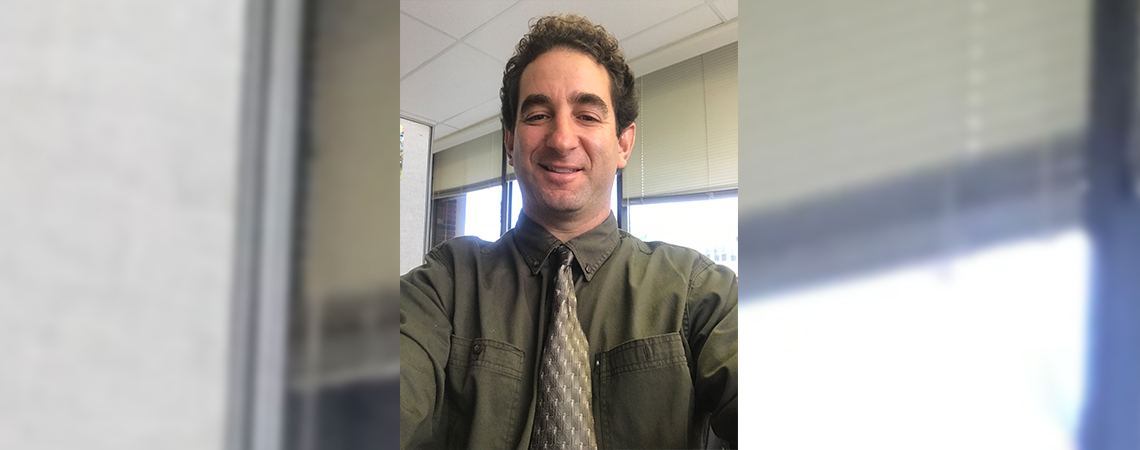Student Spotlight with Michael Yustin
Michael Yustin is an FAU alumnus who graduated in 1998 with his B.A. in Geography and Environmental Studies Certificate and in 2006 with his M.S. in Environmental Science. Yustin has been a Project Manager in the Ecosystem Restoration and Management Division for the last six years at the Martin County Board of Country Commissioners in Stuart, Florida.
What are some of your core responsibilities?
I am responsible for managing conservation lands throughout Martin County. As a Project Manager, my responsibilities vary significantly. I oversee habitat restoration projects that involve improving wetland hydrology and function, reducing pollution from stormwater runoff, invasive species removal, prescribed fire, and rare habitat replanting. I also develop public access facilities, provide public outreach, oversee volunteers, write management plans and apply for grant funding. Some of my biggest projects involve coordinating regional projects that support the restoration of the headwaters to the Northwest Fork of the Loxahatchee River. For instance, I recently was the County liaison to the Loxahatchee River Project Delivery Team. This team developed a Comprehensive Everglades Restoration Project (CERP) plan for the Loxahatchee River that is currently going to the U.S. Congress for authorization. The cost tag for that project is $700,000,000. I have also coordinated the design and construction of several projects to restore Cypress Creek and Kitching Creek, which are two key tributaries to the Loxahatchee River.
One of the things I enjoy most about working for Martin County is that I get to manage projects on a very broad array of highly sensitive environmental lands. The County owns and/or manages conservation areas that span from the Atlantic Ocean to Lake Okeechobee. Furthermore, there are two river systems in Martin County (the St. Lucie River and the Loxahatchee River), the Indian River Lagoon and Lake Okeechobee. Through my position in Martin County, I am involved in working to protect and restore all of those amazing water bodies. Another rewarding aspect of my job is carrying out a restoration project and then seeing how it benefits wildlife and the environment. For instance, one of my projects involved restoring hydrologic function to the 1,300-acre Culpepper Ranch property. Several thousand acres of wetland dominant habitat all drain through Culpepper Ranch and into the Loxahatchee River. The property was drained, ditched and parts were turned into the cow pasture. The drainage was so extensive that most of the property was dry even in the rainy season. A County project involved restoring natural flow patterns by removing berms and ditching and putting control structure on several culverts. The hydrologic benefits of the project extended far beyond the property boundaries and improved close to 4,000-acres of wetland dominated habitat. On a recent site visit, several Federally Endangered snail kites were observed using some former pasture areas on the Culpepper Ranch property. These snail kites need relatively healthy wetland systems with stable water levels to survive. In short, the County project was successful at restoring wetlands and creating high-quality wetland habitat.
How did FAU help prepare you for this role?
FAU has one of the stronger Geoscience programs in the region and I use Remote Sensing/ GIS on a daily basis for my job. I also think that the Geoscience and the Environmental Science Program seemed to work very closely together. Even though my thesis was related to Environmental Science, my project leaned heavily on the Geoscience world. Two of my primary professors on my advisory committee were in the Geoscience program. I also think that Geography as a whole has value for environmental professionals. My experience in the Geography program taught me the value of looking at projects from a landscape-scale perspective. Geography is also a field that incorporates a broad array of different sciences. I think that is very important because working in the environmental field tends to require knowledge in a very broad array of subject areas. My projects may involve using mapping tools, wetland science, fire ecology, soil science, plant or animal biology, and even engineering. I think that the Geoscience and the Environmental Sciences provided me with the background to understand aspects of those different fields.
I think the physical location of FAU is also very important. There is so much going on in the South Florida area related to the Everglades system and its restoration. FAU provided me with the opportunity to learn more about the Everglades and CERP. It helped me develop my passion for protecting and restoring South Florida's unique ecology.
What did you enjoy about your experience at FAU?
I developed very close relationships with several professors in the GeoSciences program. The smaller class sizes and close relationships really helped me develop into an environmental professional. I also had an amazing advisory committee that guided me through my thesis. The program was also convenient for my Master's Degree because I was able to have a job, take classes and work on my thesis at the same time. For most of the time I was working on my thesis I was also employed at Pine Jog Environmental Education Center. Pine Jog, due to being a part of FAU, offered free tuition for employees. I think that FAU's relationship with places like Pine Jog and Harbor Branch were real strengths of the program.
What research did you perform while at FAU? And how did the faculty help you through your thesis or dissertation?
I completed a historical and environmental assessment of Grassy Waters Preserve. Grassy Waters is a shallow wetland system that provides the water supply for the City of West Palm Beach. I used aerial photography to document shifts in vegetation communities between 1940 and 1999.
What tips would you give to current students in the College of Science looking to pursue a career in your field?
Intern, volunteer, and network! Get out and meet people in the field. The more experience you have when you graduate the easier it will be to land that all-important first job.

